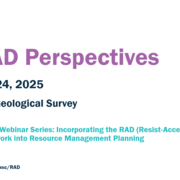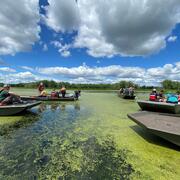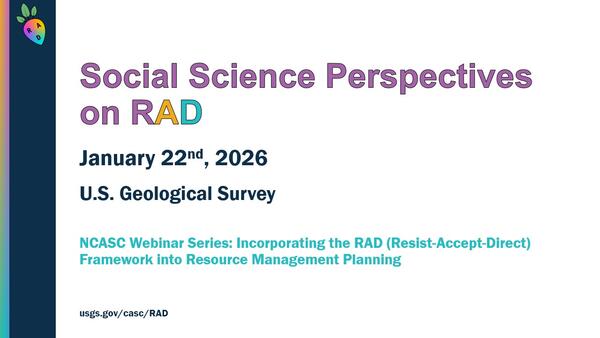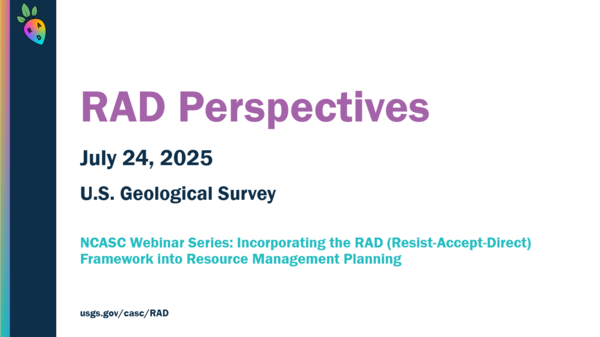RAD is intended to help managers intentionally expand their thinking beyond traditional conservation approaches. Recent interdisciplinary and cross-agency research has integrated the social sciences to explore how and why managers are making RAD decisions.
Abigail J. Lynch, Ph.D.
Abigail (Abby) J. Lynch is a Research Fish Biologist with the USGS National Climate Adaptation Science Center. Abby conducts science and science syntheses on the impacts of global change to inland fishes at local, national, and global scales. Her work aims to inform conservation and sustainable use and to help fishers, managers, and other practitioners adapt to change.
Collaborative Networks
Abby leads the National CASC's aquatics program and co-leads the CASC Fish Research Team. She is adjunct/affiliate faculty at Michigan State University, North Carolina State University, the University of Florida, and the University of Missouri.
She serves as the coordinator for the international 'InFish' research network, a steward for the Fish and Climate Change Database (FiCli) and the U.S. Inland Creel & Angler Survey Catalog (CreelCat), an Associate Editor for Fisheries Management and Ecology, and an Editorial Board member for Sustainability Science.
Abby received her Ph.D. in Fisheries and Wildlife from Michigan State University on climate impacts to Great Lakes Lake Whitefish, M.S. in marine science on Atlantic Menhaden population genetics at the Virginia Institute of Marine Science, College of William & Mary, and B.S. in biology and B.A. in English literature from the University of Virginia. She also served as a Knauss Marine Policy Fellow with the U.S. Fish & Wildlife Service's Fisheries Program.
Education and Certifications
Ph.D. in Fisheries and Wildlife, Michigan State University
M.S. in Marine Science, College of William & Mary
B.S. in Biology, University of Virginia
B.A. in English, University of Virginia
Affiliations and Memberships*
IUCN Freshwater Fish Specialist Group; IUCN Fisheries Expert Group
IPBES Global and Nexus Assessments (Fellow, Lead Author, Programmatic Review Panelist)
2024 World Fisheries Congress International Program Committee (Co-chair)
UN International Year of Artisanal Fisheries and Aquaculture 2022 (International Steering Committee)
FAO International Symposium on Fisheries Sustainability (Advisory Board Member)
American Fisheries Society International Fisheries Section (Past-President)
Honors and Awards
Outstanding Young Alumni Award, Michigan State University College of Agriculture & Natural Resources
Science and Products
Incorporating the RAD (Resist-Accept-Direct) Framework into Resource Management Planning: RAD Perspectives
RAD in the Wild
The Resist-Accept-Direct (RAD) Framework
CASC Fish Research
Science to Action Fellowship Science to Action Fellowship
Webinar: The RAD (Resist-Accept-Direct) Climate Adaptation Framework
Diverse Knowledge Systems (DKS) for Climate Adaptation Fellowship
Informing Mekong River Basin Resiliency and Climate Adaptation
“Climate-Smart” Fisheries and Aquaculture to Support Resilient Aquatic Ecosystems in Vietnam
Evaluating How Changing Climate and Water Clarity Can Affect Restoration of Native Coregonine Fish in Midwestern Lakes
Developing an Indicator of Species Vulnerability to Climate Change to Support a Consistent Nationwide Approach to Assessing Vulnerability
Connecting Ecosystems from Mountains to the Sea in a Changing Climate
Cisco Egg Hatching Data for UV-lamp Phototron Experiments Cisco Egg Hatching Data for UV-lamp Phototron Experiments
The Effects of Flow Extremes on Native and Non-native Stream Fishes in Puerto Rico The Effects of Flow Extremes on Native and Non-native Stream Fishes in Puerto Rico
The U.S. Inland Creel and Angler Survey Catalog (CreelCat): A Database and Interactive Tool for Inland Fisheries Management and Research The U.S. Inland Creel and Angler Survey Catalog (CreelCat): A Database and Interactive Tool for Inland Fisheries Management and Research
The US Inland Creel and Angler Survey Catalog (CreelCat) Application and CreelCatch R Package The US Inland Creel and Angler Survey Catalog (CreelCat) Application and CreelCatch R Package
Global dataset of nutritional value, economic value, and climate vulnerability for species-specific recreational fisheries harvest for consumption (ver. 1.1, August 2025) Global dataset of nutritional value, economic value, and climate vulnerability for species-specific recreational fisheries harvest for consumption (ver. 1.1, August 2025)
The U.S. Inland Creel and Angler Survey Catalog (CreelCat): A Database and Interactive Tool for Inland Fisheries Management and Research (Depreciated April 2024) The U.S. Inland Creel and Angler Survey Catalog (CreelCat): A Database and Interactive Tool for Inland Fisheries Management and Research (Depreciated April 2024)
The U.S. Inland Creel and Angler Survey Catalog (CreelCat): A Database and Interactive Tool for Inland Fisheries Management and Research (Depreciated April 2023) The U.S. Inland Creel and Angler Survey Catalog (CreelCat): A Database and Interactive Tool for Inland Fisheries Management and Research (Depreciated April 2023)
FiCli: Fish and Climate Change Database (ver. 3.0, October 2024) FiCli: Fish and Climate Change Database (ver. 3.0, October 2024)
Fish and Climate Change (FiCli) Database: Informing climate change adaptation and management actions for freshwater fishes Fish and Climate Change (FiCli) Database: Informing climate change adaptation and management actions for freshwater fishes
High-Resolution Georeferenced Major Rivers Point Data, Spaced in 150m intervals High-Resolution Georeferenced Major Rivers Point Data, Spaced in 150m intervals
RAD is intended to help managers intentionally expand their thinking beyond traditional conservation approaches. Recent interdisciplinary and cross-agency research has integrated the social sciences to explore how and why managers are making RAD decisions.
In this "RAD Perspectives" webinar, RAD (Resist-Accept-Direct) practitioners from the National Park Service, Great Lakes Indian Fish & Wildlife Commission (GLIFWC), Minnesota Department of Natural Resources, and the U.S.
In this "RAD Perspectives" webinar, RAD (Resist-Accept-Direct) practitioners from the National Park Service, Great Lakes Indian Fish & Wildlife Commission (GLIFWC), Minnesota Department of Natural Resources, and the U.S.
A video narrated by National CASC Fish Biologist Abby Lynch explaining the Resist-Accept-Direct Framework, a decision-making tool that helps resource managers make informed strategies for responding to ecological changes resulting from climate change_._ The video is a narrated slide show with animations and photos guiding the viewer through the framework.
A video narrated by National CASC Fish Biologist Abby Lynch explaining the Resist-Accept-Direct Framework, a decision-making tool that helps resource managers make informed strategies for responding to ecological changes resulting from climate change_._ The video is a narrated slide show with animations and photos guiding the viewer through the framework.
A video narrated by National CASC Fish Biologist Abby Lynch explaining the Resist-Accept-Direct Framework, a decision-making tool that helps resource managers make informed strategies for responding to ecological changes resulting from climate change_._ The video is a narrated slide show with animations and photos guiding the viewer through the framework.
A video narrated by National CASC Fish Biologist Abby Lynch explaining the Resist-Accept-Direct Framework, a decision-making tool that helps resource managers make informed strategies for responding to ecological changes resulting from climate change_._ The video is a narrated slide show with animations and photos guiding the viewer through the framework.
 Thumbnail for video "The RAD Framework for Ecosystem Management amid Climate Breakdown"
Thumbnail for video "The RAD Framework for Ecosystem Management amid Climate Breakdown"
RAD Framework for Ecosystem Management amid Climate Breakdown (Audio Described)
RAD Framework for Ecosystem Management amid Climate Breakdown (Audio Described)The Resist-Accept-Direct (RAD) framework is a decision-making tool that helps resource managers make informed strategies for responding to ecological changes resulting from climate change.
RAD Framework for Ecosystem Management amid Climate Breakdown (Audio Described)
RAD Framework for Ecosystem Management amid Climate Breakdown (Audio Described)The Resist-Accept-Direct (RAD) framework is a decision-making tool that helps resource managers make informed strategies for responding to ecological changes resulting from climate change.
 Thumbnail for video "The RAD Framework for Ecosystem Management amid Climate Breakdown"
Thumbnail for video "The RAD Framework for Ecosystem Management amid Climate Breakdown"
RAD Framework for Ecosystem Management amid Climate Breakdown
RAD Framework for Ecosystem Management amid Climate BreakdownThe Resist-Accept-Direct (RAD) framework is a decision-making tool that helps resource managers make informed strategies for responding to ecological changes resulting from climate change.
RAD Framework for Ecosystem Management amid Climate Breakdown
RAD Framework for Ecosystem Management amid Climate BreakdownThe Resist-Accept-Direct (RAD) framework is a decision-making tool that helps resource managers make informed strategies for responding to ecological changes resulting from climate change.
Artisanal Fishing in Lao PDR
Artisanal Fishing in Lao PDR
Fisherman on the Mekong River, Lao PDR
Fisherman on the Mekong River, Lao PDR
Action in uncertainty: Data-driven decisions that acknowledge emotional responses and transcendental connections Action in uncertainty: Data-driven decisions that acknowledge emotional responses and transcendental connections
Best practices for understanding recreational fishers Best practices for understanding recreational fishers
Complexity and integration of recreational fisheries Complexity and integration of recreational fisheries
Preface Preface
Global recreational consumption of non-native inland fish: Higher economic benefits, but lower nutritional value and climate resilience Global recreational consumption of non-native inland fish: Higher economic benefits, but lower nutritional value and climate resilience
Advancing climate adaptation for inland fish and fisheries Advancing climate adaptation for inland fish and fisheries
Disentangling the historical impacts of warming and fishing on exploited freshwater fish populations Disentangling the historical impacts of warming and fishing on exploited freshwater fish populations
Reframing fish passage prioritization for human nutrition outcomes Reframing fish passage prioritization for human nutrition outcomes
RAD (Resist-Accept-Direct) switch points and triggers for adaptation planning RAD (Resist-Accept-Direct) switch points and triggers for adaptation planning
Perceptions of climate vulnerability for subsistence inland fisheries in the United States Perceptions of climate vulnerability for subsistence inland fisheries in the United States
Integrating the resist–accept–direct framework into natural resource decision-making processes for climate adaptation Integrating the resist–accept–direct framework into natural resource decision-making processes for climate adaptation
Ecological acclimation: A framework to integrate fast and slow responses to climate change Ecological acclimation: A framework to integrate fast and slow responses to climate change
Recreational Inland Fisheries as Food Recreational Inland Fisheries as Food
Lake Class and Walleye Natural Resources Information Lake Class and Walleye Natural Resources Information
U.S. Inland Creel and Angler Survey Catalog (CreelCat) U.S. Inland Creel and Angler Survey Catalog (CreelCat)
Inland Fisheries Across the World: Assessing the State of Freshwater Aquatic Resources Inland Fisheries Across the World: Assessing the State of Freshwater Aquatic Resources
The Fish and Climate Change Database (FiCli) The Fish and Climate Change Database (FiCli)
The US Inland Creel and Angler Survey Catalog (CreelCat) Application and CreelCatch R Package The US Inland Creel and Angler Survey Catalog (CreelCat) Application and CreelCatch R Package
Science and Products
Incorporating the RAD (Resist-Accept-Direct) Framework into Resource Management Planning: RAD Perspectives
RAD in the Wild
The Resist-Accept-Direct (RAD) Framework
CASC Fish Research
Science to Action Fellowship Science to Action Fellowship
Webinar: The RAD (Resist-Accept-Direct) Climate Adaptation Framework
Diverse Knowledge Systems (DKS) for Climate Adaptation Fellowship
Informing Mekong River Basin Resiliency and Climate Adaptation
“Climate-Smart” Fisheries and Aquaculture to Support Resilient Aquatic Ecosystems in Vietnam
Evaluating How Changing Climate and Water Clarity Can Affect Restoration of Native Coregonine Fish in Midwestern Lakes
Developing an Indicator of Species Vulnerability to Climate Change to Support a Consistent Nationwide Approach to Assessing Vulnerability
Connecting Ecosystems from Mountains to the Sea in a Changing Climate
Cisco Egg Hatching Data for UV-lamp Phototron Experiments Cisco Egg Hatching Data for UV-lamp Phototron Experiments
The Effects of Flow Extremes on Native and Non-native Stream Fishes in Puerto Rico The Effects of Flow Extremes on Native and Non-native Stream Fishes in Puerto Rico
The U.S. Inland Creel and Angler Survey Catalog (CreelCat): A Database and Interactive Tool for Inland Fisheries Management and Research The U.S. Inland Creel and Angler Survey Catalog (CreelCat): A Database and Interactive Tool for Inland Fisheries Management and Research
The US Inland Creel and Angler Survey Catalog (CreelCat) Application and CreelCatch R Package The US Inland Creel and Angler Survey Catalog (CreelCat) Application and CreelCatch R Package
Global dataset of nutritional value, economic value, and climate vulnerability for species-specific recreational fisheries harvest for consumption (ver. 1.1, August 2025) Global dataset of nutritional value, economic value, and climate vulnerability for species-specific recreational fisheries harvest for consumption (ver. 1.1, August 2025)
The U.S. Inland Creel and Angler Survey Catalog (CreelCat): A Database and Interactive Tool for Inland Fisheries Management and Research (Depreciated April 2024) The U.S. Inland Creel and Angler Survey Catalog (CreelCat): A Database and Interactive Tool for Inland Fisheries Management and Research (Depreciated April 2024)
The U.S. Inland Creel and Angler Survey Catalog (CreelCat): A Database and Interactive Tool for Inland Fisheries Management and Research (Depreciated April 2023) The U.S. Inland Creel and Angler Survey Catalog (CreelCat): A Database and Interactive Tool for Inland Fisheries Management and Research (Depreciated April 2023)
FiCli: Fish and Climate Change Database (ver. 3.0, October 2024) FiCli: Fish and Climate Change Database (ver. 3.0, October 2024)
Fish and Climate Change (FiCli) Database: Informing climate change adaptation and management actions for freshwater fishes Fish and Climate Change (FiCli) Database: Informing climate change adaptation and management actions for freshwater fishes
High-Resolution Georeferenced Major Rivers Point Data, Spaced in 150m intervals High-Resolution Georeferenced Major Rivers Point Data, Spaced in 150m intervals
RAD is intended to help managers intentionally expand their thinking beyond traditional conservation approaches. Recent interdisciplinary and cross-agency research has integrated the social sciences to explore how and why managers are making RAD decisions.
RAD is intended to help managers intentionally expand their thinking beyond traditional conservation approaches. Recent interdisciplinary and cross-agency research has integrated the social sciences to explore how and why managers are making RAD decisions.
In this "RAD Perspectives" webinar, RAD (Resist-Accept-Direct) practitioners from the National Park Service, Great Lakes Indian Fish & Wildlife Commission (GLIFWC), Minnesota Department of Natural Resources, and the U.S.
In this "RAD Perspectives" webinar, RAD (Resist-Accept-Direct) practitioners from the National Park Service, Great Lakes Indian Fish & Wildlife Commission (GLIFWC), Minnesota Department of Natural Resources, and the U.S.
A video narrated by National CASC Fish Biologist Abby Lynch explaining the Resist-Accept-Direct Framework, a decision-making tool that helps resource managers make informed strategies for responding to ecological changes resulting from climate change_._ The video is a narrated slide show with animations and photos guiding the viewer through the framework.
A video narrated by National CASC Fish Biologist Abby Lynch explaining the Resist-Accept-Direct Framework, a decision-making tool that helps resource managers make informed strategies for responding to ecological changes resulting from climate change_._ The video is a narrated slide show with animations and photos guiding the viewer through the framework.
A video narrated by National CASC Fish Biologist Abby Lynch explaining the Resist-Accept-Direct Framework, a decision-making tool that helps resource managers make informed strategies for responding to ecological changes resulting from climate change_._ The video is a narrated slide show with animations and photos guiding the viewer through the framework.
A video narrated by National CASC Fish Biologist Abby Lynch explaining the Resist-Accept-Direct Framework, a decision-making tool that helps resource managers make informed strategies for responding to ecological changes resulting from climate change_._ The video is a narrated slide show with animations and photos guiding the viewer through the framework.
 Thumbnail for video "The RAD Framework for Ecosystem Management amid Climate Breakdown"
Thumbnail for video "The RAD Framework for Ecosystem Management amid Climate Breakdown"
RAD Framework for Ecosystem Management amid Climate Breakdown (Audio Described)
RAD Framework for Ecosystem Management amid Climate Breakdown (Audio Described)The Resist-Accept-Direct (RAD) framework is a decision-making tool that helps resource managers make informed strategies for responding to ecological changes resulting from climate change.
RAD Framework for Ecosystem Management amid Climate Breakdown (Audio Described)
RAD Framework for Ecosystem Management amid Climate Breakdown (Audio Described)The Resist-Accept-Direct (RAD) framework is a decision-making tool that helps resource managers make informed strategies for responding to ecological changes resulting from climate change.
 Thumbnail for video "The RAD Framework for Ecosystem Management amid Climate Breakdown"
Thumbnail for video "The RAD Framework for Ecosystem Management amid Climate Breakdown"
RAD Framework for Ecosystem Management amid Climate Breakdown
RAD Framework for Ecosystem Management amid Climate BreakdownThe Resist-Accept-Direct (RAD) framework is a decision-making tool that helps resource managers make informed strategies for responding to ecological changes resulting from climate change.
RAD Framework for Ecosystem Management amid Climate Breakdown
RAD Framework for Ecosystem Management amid Climate BreakdownThe Resist-Accept-Direct (RAD) framework is a decision-making tool that helps resource managers make informed strategies for responding to ecological changes resulting from climate change.
Artisanal Fishing in Lao PDR
Artisanal Fishing in Lao PDR
Fisherman on the Mekong River, Lao PDR
Fisherman on the Mekong River, Lao PDR
Action in uncertainty: Data-driven decisions that acknowledge emotional responses and transcendental connections Action in uncertainty: Data-driven decisions that acknowledge emotional responses and transcendental connections
Best practices for understanding recreational fishers Best practices for understanding recreational fishers
Complexity and integration of recreational fisheries Complexity and integration of recreational fisheries
Preface Preface
Global recreational consumption of non-native inland fish: Higher economic benefits, but lower nutritional value and climate resilience Global recreational consumption of non-native inland fish: Higher economic benefits, but lower nutritional value and climate resilience
Advancing climate adaptation for inland fish and fisheries Advancing climate adaptation for inland fish and fisheries
Disentangling the historical impacts of warming and fishing on exploited freshwater fish populations Disentangling the historical impacts of warming and fishing on exploited freshwater fish populations
Reframing fish passage prioritization for human nutrition outcomes Reframing fish passage prioritization for human nutrition outcomes
RAD (Resist-Accept-Direct) switch points and triggers for adaptation planning RAD (Resist-Accept-Direct) switch points and triggers for adaptation planning
Perceptions of climate vulnerability for subsistence inland fisheries in the United States Perceptions of climate vulnerability for subsistence inland fisheries in the United States
Integrating the resist–accept–direct framework into natural resource decision-making processes for climate adaptation Integrating the resist–accept–direct framework into natural resource decision-making processes for climate adaptation
Ecological acclimation: A framework to integrate fast and slow responses to climate change Ecological acclimation: A framework to integrate fast and slow responses to climate change
Recreational Inland Fisheries as Food Recreational Inland Fisheries as Food
Lake Class and Walleye Natural Resources Information Lake Class and Walleye Natural Resources Information
U.S. Inland Creel and Angler Survey Catalog (CreelCat) U.S. Inland Creel and Angler Survey Catalog (CreelCat)
Inland Fisheries Across the World: Assessing the State of Freshwater Aquatic Resources Inland Fisheries Across the World: Assessing the State of Freshwater Aquatic Resources
The Fish and Climate Change Database (FiCli) The Fish and Climate Change Database (FiCli)
The US Inland Creel and Angler Survey Catalog (CreelCat) Application and CreelCatch R Package The US Inland Creel and Angler Survey Catalog (CreelCat) Application and CreelCatch R Package
*Disclaimer: Listing outside positions with professional scientific organizations on this Staff Profile are for informational purposes only and do not constitute an endorsement of those professional scientific organizations or their activities by the USGS, Department of the Interior, or U.S. Government



















